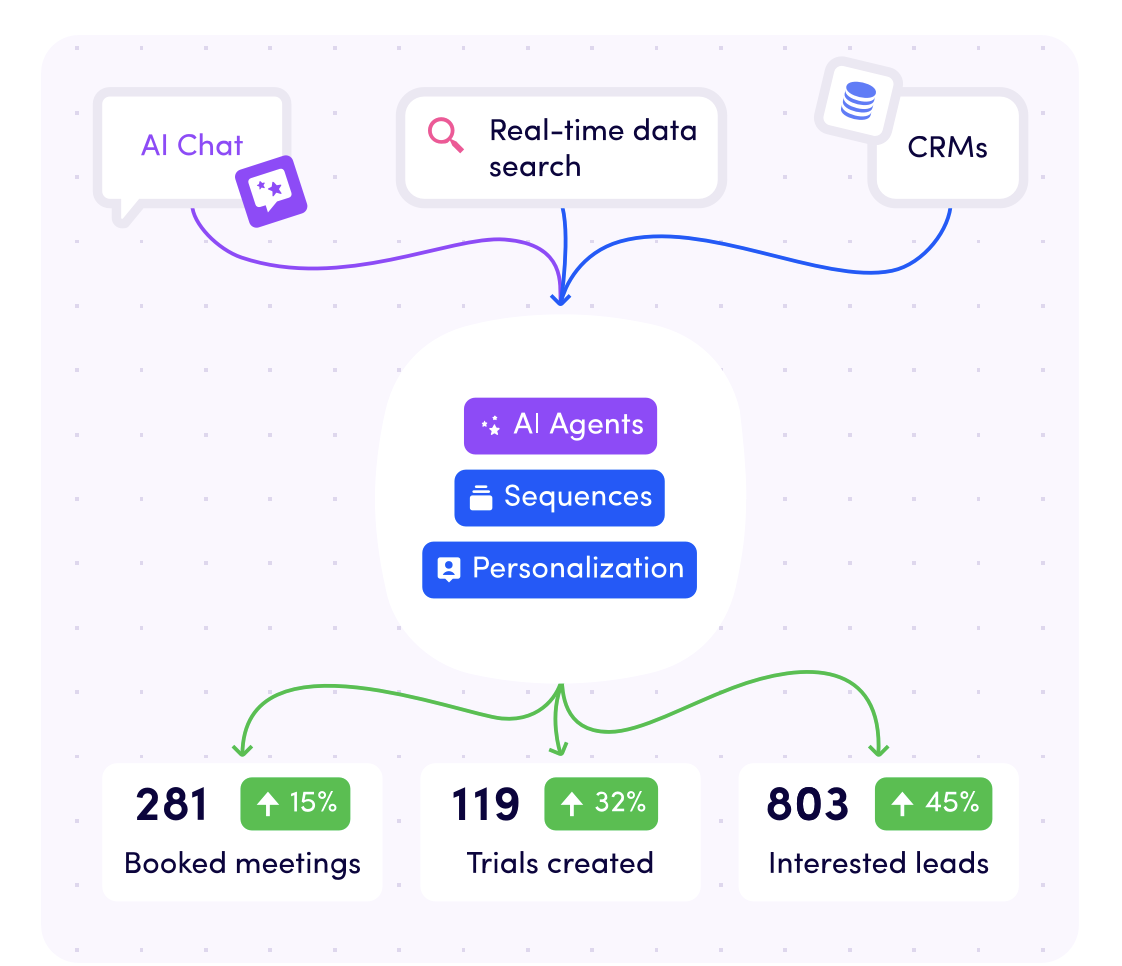The #1 Definition of Video Marketing and Powerful Strategies

Updated on 12/08/2024
Video Content marketing has become one of the most potent and viable trends in marketing over the last decade.
Virtually anyone can leverage the power of video with their mobile phones.
You can capture 4K video for sharp images. Editing is easy thanks to built-in software on Android and Apple devices.
Trends in digital marketing are changing rapidly and video marketing is becoming increasingly important.
In 2023, video marketing continued its rise in popularity reporting 86% of businesses using it in their marketing plans.
But, a solid video marketing strategy is nothing but necessary.
Key takeaways
Let's dive in!
What is Video Marketing?
Video marketing uses video types to boost brand awareness, enhance engagement across marketing channels, and drive leads or sales.
92% of marketers claim that video is an important part of their marketing strategy.
And as technology becomes easier and cheaper to access, we can only see this adoption rate continue to grow.
Next, we'll look at the benefits of offline and online video marketing and why it's important.
If you're not already using it in your marketing strategy, these stats could convince you to start now rather than later!
The Importance of Video Marketing Today
Video marketing has become an essential element of modern business strategies, gaining momentum since YouTube's inception in 2005.
The landscape shifted significantly when Google acquired YouTube in 2006.
This led to an expansion of advertising opportunities on the social platform.
By the end of 2009, YouTube featured seven distinct ad formats, marking its importance in digital marketing.
The widespread use of smartphones has greatly influenced the rise of video content.
As mobile technology advances, watching animated videos on the go has become more convenient.
And this is driving a substantial increase in video clip consumption.
This also makes it possible for people to watch the entire video.
One of the key factors behind the rapid growth of video marketing is the accessibility of high-quality video production.
Advances in technology and editing software have made it easier for anyone to create professional-looking videos.
This shift allows marketers to seamlessly integrate videos into their strategies.
But, businesses that ignore this trend risk falling behind in a competitive digital environment.
You can also choose whether you want an owned, paid or earned distribution channel or video ads to drive more visitors.
So, video marketing is a vital tool in today's digital age.
Its continued evolution provides businesses with innovative ways to connect with audiences and achieve their marketing goals.
6 Reasons to Fully Understand Why Video Marketing Is Important
Video serves various purposes, from boosting brand visibility to driving leads and sales through an inbound marketing strategy.
Here, we'll discuss how businesses often use videos in marketing, using data to show why it's important.

1. Happy Customers love watching videos

People watch an average of 19 hours of online video content per week.
Video content is easy to consume and can be both educational and entertaining.
It's a great way for potential customers to learn more about a product or service.
Not to mention its power to build emotional connections, even with your current customers.
- 73% of people prefer watching a short video to learn about a product or service.
- Mobile video consumption on YouTube has doubled every year.
On average, people spend 19 hours a week watching online videos.
2. Video content can boost conversion rates and leads
86% of marketers say that video marketing helps lead generation.
81% say it has a positive impact on sales.

Video is incredibly engaging and performs incredibly well across various social media platforms.
Whether it's a social media video or a Google SERP result, video rocks.
Adding video content to your website and service pages can significantly boost engagement.
Smart companies often use videos in these spaces to showcase their products and services effectively.
Social media posts also benefit from this approach, leveraging explainer videos or customer testimonials to enhance lead generation and drive sales.
- 88% of people say they've been convinced to buy after watching a brand's video
- 78% of people say they have bought or downloaded software or an app due to video

3. Video is highly shareable
Since many of us love watching videos, we're more likely to share them with friends, family, and colleagues.
For businesses, this means your brand and its offerings can reach a wider audience.
- People are 2x more likely to share video content over posts and pages.
- The average engagement rate for short-form videos is 53.9%
- Native videos on Facebook get 10x more shares than linked videos
- Tweets on Twitter get 10x more engagement
TIP
What can be ideal in video length on Social Media?
To understand the best social media video length here is a very well-done report by Hootsuite.
4. It gets more emails opened and decreases unsubscribe rates
Email marketing is still a force to be reckoned with as it continues to offer businesses the highest ROI of any channel.
But did you know that embedding video into your emails helps make it even more effective?
Video can be used in multiple ways for email such as welcoming new customers with an introduction video or giving an explainer product video that they've shown interest in.
5. It helps you rank better on Google
To improve their SEO efforts, businesses use video marketing.
It's important to make sure your content is SEO-optimised.
For that, using video marketing efforts helps place you higher on Google's search algorithm.
- Biteable says that by using video, you are 53x more likely to reach the front page of Google
- 31% of marketers use video to improve SEO
- 60% of marketers say customer acquisition has gone up
Google's dedication to engaging users with video content is crystal clear, as demonstrated by the captivating use of YouTube video previews.
But first, the content must be relevant to the user.
This is essentially what Google prioritises when aiming to fulfil a search query.

6. Video builds trust and credibility
Using video content, companies can engage with customers on a deeper, more professional level.
Video offers numerous ways to foster trust with a broader audience and position your brand as an industry leader.
It can be through explainer videos, tutorials, product demonstrations, virtual tours, introductions to the marketing team, or onboarding sessions.
That way, companies can engage with customers more effectively.
- 91% of users are happy to watch video content
- 31.3% would like how-to videos
- 29.8% want educational videos

8 Video Marketing Examples
Now we know how valuable video marketing can be for your business let's turn our attention to some types of video marketing with a few examples.
These range from long-form videos to short-form and from educational to sales-focused but all have immense value in their own right.
1. Brand videos
Brand videos serve as part of a larger marketing campaign to raise brand awareness and increase traffic.
So much can be said about a brand through video; the art style, direction, and message itself tell customers who the brand is and shed light on its values, mission, Coca-Cola, and culture.
They are a highly effective form of video content that quickly captures your target audience's attention and delivers significant impact.
2. Explainer videos
Explainer videos are a great way to show how your product or service can benefit the end user, the customer.
Often these will involve storytelling behind the scenes, creating fictional circumstances where the person finds a solution to their problem using, you guessed it, your brand!
Or, these can be funny or edgy by tapping into a brand's target audience in the best way possible like the example below.
3. Demo videos
If explainer videos introduce people to your brand when they're at the top of the marketing funnel (the awareness stage), product demo videos go a little deeper to showcase your product or service in more detail.
With demo videos, you can highlight specific features and benefits to drive interest and conversions.
4. How-To and explainer video
How-to videos help to educate your audience on your product or service in a very convenient way.
This video marketing example is hugely popular for onboarding as brands can show a customer exactly how to do something and then a well-timed call to action increases signups!
It also enhances customer relationships by building trust and authority in your niche through the delivery of valuable content.
5. Expert Interviews and Q&A videos
This type of video content answers customers' most burning questions and shows that you're listening to your audience.
They also build authority and credibility in your industry by offering detailed insights on relevant topics, and featuring influential and respected community members.
6. Event videos
If you have a hot event, then event videos are a great way to generate interest and spread awareness.
From fundraisers to webinars and conferences, use this video strategy to let people know what, when, and where it's happening.
7. Case Studies and Testimonial videos
Social proofing is a powerful marketing strategy that leans on using customer experiences to inspire confidence in new customers.
We're naturally more inclined to trust or try a new product or service if we see that it has worked for other people and they've had a positive experience.
Share case studies to show how your product or service solves real problems for customers.
Also, use testimonials to boost confidence and trust.
8. User-Generated Content
Collaborating with your audience saves time, promotes your brand on social media channels, and raises awareness whilst building social proof simultaneously.
Encourage your audience to interact and share content with competitions, guest blogs, influencer marketing, and more.
Will You Join 79% of Marketers Planning to Use a Video Marketing Strategy?
Of the companies already using video marketing in their overall digital marketing strategy, 99% of them will continue you use it. And of those that don't, 79% said they would.
With almost 9 out of 10 customers wanting to see video content online, there's a clear demand for the medium, and savvy businesses are already reaping the rewards of incorporating a video marketing campaign.
FAQs
1. What is video marketing, and why is it important?
Video marketing involves using videos to promote your brand, products, or services across various online platforms. It's important because videos are highly engaging and can easily capture attention, making them an effective tool for boosting brand awareness, increasing customer engagement, and driving sales. Videos also enhance search engine optimisation (SEO), helping your content reach a wider audience.
2. What types of videos are most effective for social media?
Popular types of social media video marketing include short-form content like Instagram Reels, which are ideal for quick engagement. Instructional videos are also effective for educating your audience, while viral videos can rapidly increase brand visibility. The key is to create social content videos that are tailored to your target audience and aligned with your video goals.
3. How can I measure the success of my video marketing campaign?
You can measure the success of your video marketing efforts using video analytics tools. These tools track metrics such as video views, engagement rates, and view-through rates. Analysing this data helps you understand your audience's behaviour, optimise content, and make informed decisions for future campaigns. Platforms like YouTube and Instagram also provide insights into how your videos perform.
4. What are the best practices for creating a successful video marketing campaign?
To create a successful video marketing campaign, start with a clear creative vision and define your video goals. During the video creation process, focus on producing high-quality content that resonates with your target audience. Use a reliable video hosting platform to distribute your videos and ensure they load quickly. Finally, monitor your video performance and make adjustments based on the data.
5. What role does video play in the buyer's decision process?
Video plays a crucial role in the buyer's decision-making process, especially during the Consideration Stage. Instructional videos and product demonstrations help potential customers understand the benefits of your offering. Dynamic videos that tell a compelling story can influence buying decisions by building trust and showcasing your brand's value.
6. What are some benefits of video marketing?
Video marketing offers numerous benefits, including:
- Boosting brand awareness and recognition across various social channels, making your brand more memorable.
- Increasing customer engagement through social videos on platforms like Instagram, YouTube, and other video marketing platforms, where video marketers can reach a wide audience.
- Improving search engine optimisation (SEO) by enhancing your website's visibility with well-optimised video content that attracts more traffic to your blog posts and e-commerce pages.
- Conveying information quickly and effectively through different styles of video, catering to various audience preferences, including educational content, consideration-stage videos, and visual content that resonates.
- Building trust and credibility with your audience through well-crafted marketing videos, helping to create satisfied customers and strong video-based relationships.
- Providing measurable metrics through video marketing platforms to analyse ROI, enables video marketers to quantify the success of their campaigns and make data-driven decisions.
- Driving sales and conversions by integrating videos into your sales team's strategy, especially in email blasts, social posts, and throughout the customer funnel stage, enhancing distribution efforts.
- Supporting post-production refinement, allowing for high-quality content that resonates with different audience demographics and keeps them engaged.
7. Why video marketing is so powerful?
Video marketing is powerful because it offers a visual and immersive experience that captivates viewers. It allows for effective storytelling across video platforms, fostering a human connection that builds trust and loyalty. By using video marketing platforms, businesses can create social videos that enhance search engine optimisation (SEO), leading to increased website traffic, lower bounce rates, and higher conversions. Whether it's a 15-second video or a longer piece of content, videos engage and retain audience attention better than other mediums.
8. What are the disadvantages of video marketing?
The main disadvantages of video marketing include:
- Time-consuming: The video creation process, from pre-production to post-production, requires significant time and effort.
- Expensive: High-quality marketing videos often involve costly equipment, professional video platforms, and skilled talent.
- Technical issues: Videos may face buffering, upload challenges, or compatibility issues on different video platforms.
- Limited access: Some users may lack the technology, internet speed, or data plans to view videos, especially on certain platforms.
- Attention span: Viewers may lose interest in lengthy videos, making it essential to create engaging types of content like 15-second videos.
- Ineffectiveness for some audiences: Not all audiences prefer video content; some may find other forms of content or email blasts more accessible.
Become a Certified Digital Marketer!
Master the fundamentals of digital marketing as you learn about:
-
Module 1 - Introduction to Digital Marketing
-
Module 2 - Tracking and Analytics
-
Module 3 - Targeting your audience organically with awareness channels
-
Module 4 - Targeting your audience using paid media
-
Module 5 - Retargeting your audience
-
Module 6 - Landing page optimisation
Learning with Growth Tribe couldn't be easier.
All of our courses are designed to be flexible for the learner with self-paced content so you can manage your time and learning, to best suit your lifestyle.
Join a community of over 35,000 certified alumni who share a passion for growing their skills and positively impacting their careers.
Categories
- Business & Innovation (83)
- Growth & Marketing (72)
- Artificial Intelligence (53)
- Data & Analytics (16)
- Case studies (10)
- Project Management (10)
Related articles
Latest articles
AI in Finance: Why You Need It Now
Imagine a world where loans are approved in seconds. Sounds...
ChatGPT Search Unveiled: Should You Make The Switch Now?
Picture this: You’re no longer just “searching” the web—you’re...
Shadow AI Explained: How to Harness Hidden AI Without the Risks
Picture this: your team is under pressure to deliver results—fast....
The 33 best AI tools for commercial teams
The tools are split into 2 categories The best AI tools for your...



















